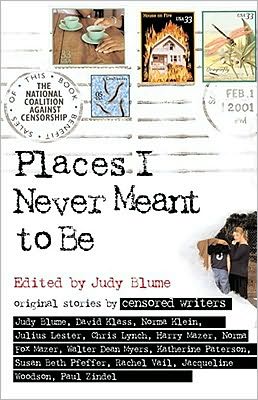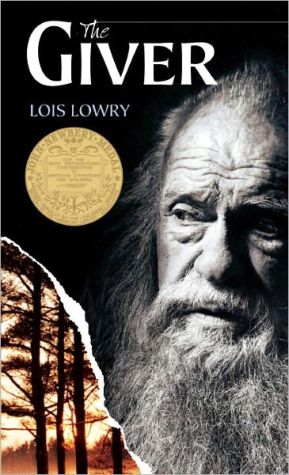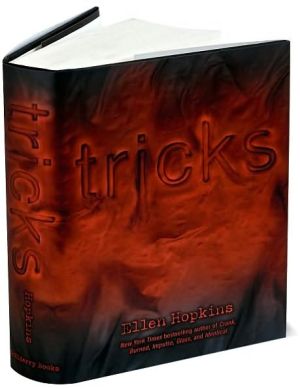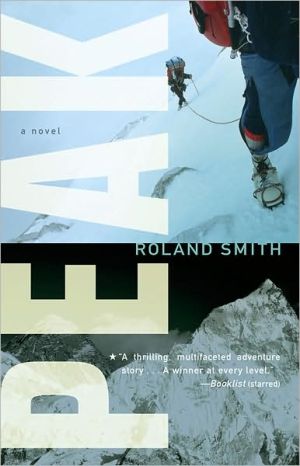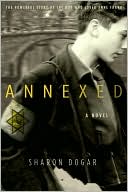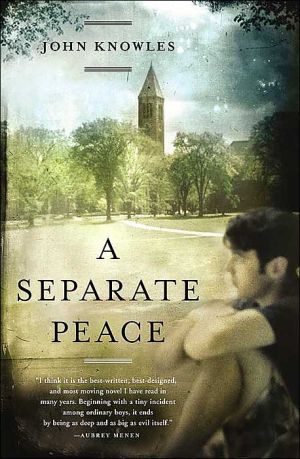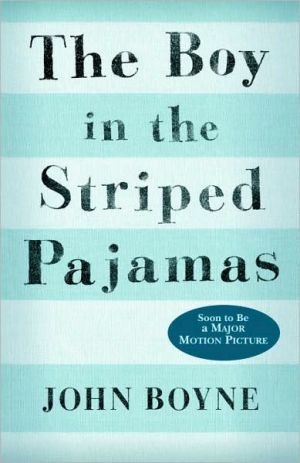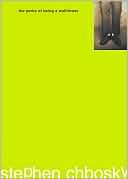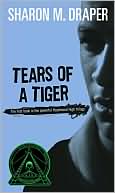Places I Never Meant to Be: Original Stories by Censored Writers
"What effect does [the climate of censorship] have on a writer?....It's chilling.\ It's easy to become discouraged, to second-guess everything you write. There seemed to be no one to stand up to the censors....so I began to speak out about my experiences. And once I did, I found that I wasn't as alone as I'd thought."\ — from Judy Blume's introduction to Places I Never Meant to Be\ Judy Blume is not alone: Many of today's most distinguished authors of books for young people have found their...
Search in google:
"What effect does [the climate of censorship] have on a writer?....It's chilling.It's easy to become discouraged, to second-guess everything you write. There seemed to be no one to stand up to the censors....so I began to speak out about my experiences. And once I did, I found that I wasn't as alone as I'd thought." — from Judy Blume's introduction to Places I Never Meant to BeJudy Blume is not alone: Many of today's most distinguished authors of books for young people have found their work censored or challenged. Eleven of them have contributed original stories to this collection. Along with a story written by the late Norma Klein when she was a student at Barnard College, they comprise a stunning literary achievement as well as a battle cry against censorship.ContributorsDavid KlassNorma KleinJulius LesterChris LynchHarry MazerNorma Fox MazerWalter Dean MyersKatherine PatersonSusan Beth PfefferRachel VailJacqueline WoodsonPaul ZindelPublishers WeeklyBlume's introduction, explaining her battles with would-be censors and the risks taken by librarians and teachers who stand by books that arouse an outcry, may be the most involving element of this collection of 12 short stories by acclaimed authors. Julius Lester's protagonist risks his popularity by befriending the only white girl in his English class. Susan Beth Pfeffer shows how a girl's loyalty and morality are challenged when her father asks her to steal money from his ex-wife's secret cache. Paul Zindel conjures revenge against a high school cheerleader in a tale almost as gruesome as Stephen King's Carrie. Also included are works by Katherine Paterson, Walter Dean Myers, Rachel Vail--even the late Norma Klein (with a story originally published in a Barnard literary journal in 1959). In putting together this collection, Blume constructs a platform for writers to speak freely and honestly, not only through their fiction but with brief essays on censorship. Few of these stories represent the very best work of the contributors, but their commitment to their audience shines through, and readers will likely be inspired to seek out their other titles. Ages 12-up. (Aug.) FYI: All royalties from the sale of this book will be donated to the National Coalition Against Censorship. Copyright 1999 Cahners Business Information.
Introduction\ When I was growing up I'd heard that if a movie or book was "Banned in Boston" everybody wanted to see it or read it right away. My older brother, for example, went to see such a movie — The Outlaw, starring Jane Russell — and I wasn't supposed to tell my mother. I begged him to share what he saw, but he wouldn't. I was intensely curious about the adult world and hated the secrets my parents, and now my brother, kept from me.\ A few years later, when I was in fifth grade, my mother was reading a novel called A Rage to Live, by John O'Hara, and for the first time (and, as it turned out, the only time) in my life, she told me I was never to look at that book, at least not until I was much older. Once I knew my mother didn't want me to read it, I figured it must be really interesting!\ So, you can imagine how surprised and delighted I was when, as a junior in high school, I found John O'Hara's name on my reading list. Not a specific title by John O'Hara, but any title. I didn't waste a minute. I went down to the public library in Elizabeth, New Jersey, that afternoon — a place where I'd spent so many happy hours as a young child, I'd pasted a card pocket on the inside back cover of each book I owned — and looked for A Rage to Live. But I couldn't find it. When I asked, the librarian told me that book was restricted. It was kept in a locked closet, and I couldn't take it out without written permission from my parents.\ Aside from my mother's one moment of fear, neither of my parents had ever told me what I could or could not read. They encouraged me to read widely. There were no "Young Adult" novels then. Serious books about teenagers were published as adult novels. It was my mother who handed me To Kill a Mockingbird and Anne Frank's Diary of a Young Girl when they were first published.\ By the time I was twelve I was browsing in the bookshelves flanking the fireplace in our living room where, in my quest to make sense of the world, I discovered J.D. Salinger's The Catcher in the Rye, fell in love with the romantic tragedies of Thomas Hardy and the Brontë sisters, and overidentified with "Marjorie Morningstar."\ But at the Elizabeth Public Library the librarian didn't care. "Get permission in writing," she told me. When I realized she was not going to let me check out A Rage to Live, I was angry. I felt betrayed and held her responsible. It never occurred to me that it might not have been her choice.\ At home I complained to my family, and that evening my aunt, the principal of an elementary school, brought me her copy of A Rage to Live. I stayed up half the night reading the forbidden book. Yes, it was sexy, but the characters and their story were what kept me turning the pages. Finally, my curiosity (about that book, anyway) was satisfied. Instead of leading me astray, as my mother must have feared, it led me to read everything else I could find by the author.\ All of which brings me to the question What is censorship? If you ask a dozen people you'll get twelve different answers. When I actually looked up the word in The Concise Columbia Encyclopedia I found this definition: "[The] official restriction of any expression believed to threaten the political, social, or moral order." My thesaurus lists the following words that can be used in place of ban (as in book banning): Forbid. Prohibit. Restrict. But what do these words mean to writers and the stories they choose to tell? And what do they mean to readers and the books they choose to read?\ I began to write when I was in my mid-twenties. By then I was married with two small children and desperately in need of creative work. I wrote Are You There God? It's Me, Margaret right out of my own experiences and feelings when I was in sixth grade. Controversy wasn't on my mind. I wanted only to write what I knew to be true. I wanted to write the best, the most honest books I could, the kinds of books I would have liked to read when I was younger. If someone had told me then I would become one of the most banned writers in America, I'd have laughed.\ When Margaret was published in 1970 I gave three copies to my children's elementary school but the books never reached the shelves. The male principal decided on his own that they were inappropriate for elementary school readers because of the discussion of menstruation (never mind how many fifth- and sixth-grade girls already had their periods). Then one night the phone rang and a woman asked if I was the one who had written that book. When I replied that I was, she called me a communist and hung up. I never did figure out if she equated communism with menstruation or religion.\ In that decade I wrote thirteen other books: eleven for young readers, one for teenagers, and one for adults. My publishers were protective of me during those years and didn't necessarily share negative comments about my work. They believed if I didn't know some individuals were upset by my books, I wouldn't be intimidated.\ Of course, they couldn't keep the occasional anecdote from reaching me: the mother who admitted she'd cut two pages out of Then Again, Maybe I Won't rather than allow her almost thirteen-year-old son to read about wet dreams. Or the young librarian who'd been instructed by her male principal to keep Deenie off the shelf because in the book, Deenie masturbates. "It would be different if it were about a boy," he'd told her. "That would be normal."\ The stories go on and on but really, I wasn't that concerned. There was no organized effort to ban my books or any other books, none that I knew of, anyway. The seventies were a good decade for writers and readers. Many of us came of age during those years, writing from our hearts and guts, finding editors and publishers who believed in us, who willingly took risks to help us find our audience. We were free to write about real kids in the real world. Kids with feelings and emotions, kids with real families, kids like we once were. And young readers gobbled up our books, hungry for characters with whom they could identify, including my own daughter and son, who had become avid readers. No mother could have been more proud to see the tradition of family reading passed on to the next generation.\ Then, almost overnight, following the presidential election of 1980, the censors crawled out of the woodwork, organized and determined. Not only would they decide what their children could read but what all children could read. It was the beginning of the decade that wouldn't go away, that still won't go away almost twenty years later. Suddenly books were seen as dangerous to young minds. Thinking was seen as dangerous, unless those thoughts were approved by groups like the Moral Majority, who believed with certainty they knew what was best for everyone.\ So now we had individual parents running into schools, waving books, demanding their removal — books they hadn't read except for certain passages. Most often their objections had to do with language, sexuality, and something called "lack of moral tone."\ Those who were most active in trying to ban books came from the "religious right" but the impulse to censor spread like a contagious disease. Other parents, confused and uncertain, were happy to jump on the bandwagon. Book banning satisfied their need to feel in control of their children's lives. Those who censored were easily frightened. They were afraid of exposing their children to ideas different from their own. Afraid to answer children's questions or talk with them about sensitive subjects. And they were suspicious. They believed if kids liked a book, it must be dangerous.\ Too few schools had policies in place enabling them to deal with challenged materials. So what happened? The domino effect. School administrators sent down the word: Anything that could be seen as controversial had to go. Often books were quietly removed from school libraries and classrooms or, if seen as potential troublemakers, were never purchased in the first place. These decisions were based not on what was best for the students, but what would not offend the censors.\ I found myself at the center of the storm. My books were being challenged daily, often placed on restricted shelves (shades of Elizabeth, New Jersey, in 1955) and sometimes removed. A friend was handed a pamphlet outside a supermarket urging parents to rid their schools and libraries of Judy Blume books. Never once did the pamphlet suggest the books actually be read. Of course I wasn't the only target. Across the country, the Sex Police and the Language Police were thumbing through books at record speed, looking for illustrations, words or phrases that, taken out of context, could be used as evidence against them.\ Puberty became a dirty word, as if children who didn't read about it wouldn't know about it, and if they didn't know about it, it would never happen.\ The Moral Tone Brigade attacked Blubber (a story of victimization in the classroom) with a vengeance because, as they saw it, in this book evil goes unpunished. As if kids need to be hit over the head, as if they don't get it without having the message spelled out for them.\ I had letters from angry parents accusing me of ruining Christmas because of a chapter Superfudge called "Santa Who?" Some sent lists showing me how easily I could have substituted one word for another: meanie for bitch; darn for damn; nasty for ass. More words taken out of context. A teacher wrote to say she blacked out offending words and passages with a felt-tip marker. Perhaps most shocking of all was a letter from a nine-year-old addressed to Jewdy Blume telling me I had no right to write about Jewish angels in Starring Sally J. Freedman as Herself.\ My worst moment came when I was working with my editor on the manuscript of Tiger Eyes (the story of a fifteen-year-old girl, Davey, whose beloved father dies suddenly and violently). When we came to the scene in which Davey allows herself to feel again after months of numbness following her father's death, I saw that a few lines alluding to masturbation had been circled. My editor put down his pencil and faced me. "We want this book to reach as many readers as possible, don't we?" he asked.\ I felt my face grow hot, my stomach clench. This was the same editor who had worked with me on Are You There God? It's Me, Margaret; Then Again, Maybe I Won't; Deenie; Blubber; Forever — always encouraging, always supportive. The scene was psychologically sound, he assured me, and delicately handled. But it also spelled trouble. I got the message. If you leave in those lines, the censors will come after this book. Librarians and teachers won't buy it. Book clubs won't take it. Everyone is too scared. The political climate has changed.\ I tried to make a case for why that brief moment in Davey's life was important. He asked me how important? Important enough to keep the book from reaching its audience? I willed myself not to give in to the tears of frustration and disappointment I felt coming. I thought about the ways a writer brings a character to life on the page, the same way an artist brings a face to life on canvas — through a series of brush strokes, each detail adding to the others, until we see the essence of the person. I floundered, uncertain. Ultimately, not strong enough or brave enough to defy the editor I trusted and respected, I caved in and took out those lines. I still remember how alone I felt at that moment.\ What effect does this climate have on a writer? Chilling. It's easy to become discouraged, to second-guess everything you write. There seemed to be no one to stand up to the censors. No group as organized as they were; none I knew of, anyway. I've never forgiven myself for caving in to editorial pressure based on fear, for playing into the hands of the censors. I knew then it was all over for me unless I took a stand. So I began to speak out about my experiences. And once I did, I found that I wasn't as alone as I'd thought.\ My life changed when I learned about the National Coalition Against Censorship (NCAC) and met Leanne Katz, the tiny dynamo who was its first and longtime director. Leanne's intelligence, her wit, her strong commitment to the First Amendment and helping those who were out on a limb trying to defend it, made her my hero. Every day she worked with the teachers, librarians, parents and students caught in the cross fire. Many put themselves and their jobs on the line fighting for what they believed in.\ In Panama City, Florida, junior high school teacher Gloria Pipkin's award-winning English program was targeted by the censors for using Young Adult literature that was depressing, vulgar and immoral, specifically I Am the Cheese, by Robert Cormier, and About David, by Susan Beth Pfeffer.\ A year later, when a new book selection policy was introduced forbidding vulgar, obscene and sexually related materials, the school superintendent zealously applied it to remove more than sixty-five books, many of them classics, from the curriculum and classroom libraries. They included To Kill a Mockingbird, The Red Badge of Courage, The Great Gatsby, Wuthering Heights, and Of Mice and Men. Also banned were Shakespeare's Hamlet, King Lear, The Merchant of Venice and Twelfth Night.\ Gloria Pipkin fought a five-year battle, jeopardizing her job and personal safety (she and the reporter covering the story received death threats) to help reinstate the books. Eventually, the professional isolation as well as the watered-down curriculum led her to resign. She remains without a teaching position.\ Claudia Johnson, Florida State University professor and parent, also defended classic books by Aristophanes and Chaucer against a censor who condemned them for promoting "women's lib and pornography." She went on to fight other battles — in defense of John Steinbeck's Of Mice and Men, and a student performance of Lorraine Hansberry's A Raisin in the Sun.\ English teacher Cecilia Lacks was fired by a high school in St. Louis for permitting her creative writing students to express themselves in the language they heard and used outside of school everyday. In the court case that followed, many of her students testified on their teacher's behalf. Though she won her case, the decision was eventually reversed and at this time Lacks is still without a job.\ Colorado English teacher Alfred Wilder was fired for teaching a classic film about fascism, Bernardo Bertolucci's 1900.\ And in Rib Lake, Wisconsin, guidance counselor Mike Dishnow was fired for writing critically of the Board of Education's decision to ban my book Forever from the junior high school library. Ultimately he won a court settlement, but by then his life had been turned upside down.\ And these are just a few examples.\ This obsession with banning books continues as we approach the year 2000. Today it is not only Sex, Swear Words and Lack of Moral Tone — it is Evil, which, according to the censors, can be found lurking everywhere. Stories about Halloween, witches, and devils are an suspect for promoting Satanism. Romeo and Juliet is under fire for promoting suicide; Madeleine L'Engle's A Wrinkle in Time, for promoting New Age-ism. If the censors had their way it would be good-bye to Shakespeare as well as science fiction. There's not an ism you can think of that's not bringing some book to the battlefield.\ What I worry about most is the loss to young people. If no one speaks out for them, if they don't speak out for themselves, all they'll get for required reading will be the most bland books available. And instead of finding the information they need at the library, instead of finding the novels that illuminate life, they win find only those materials to which nobody could possibly object.\ Some people would like to rate books in schools and libraries the way they rate movies: G, PG, R, X, or even more explicitly. But according to whose standards would the books be rated? I don't know about you but I don't want anyone rating my books or the books my children or grandchildren choose to read. We can make our own decisions, thank you. Be wary of the censors' code words — family friendly; family values; excellence in education. As if the rest of us don't want excellence in education, as if we don't have our own family values, as if libraries haven't always been family-friendly places!\ And the demands are not all coming from the religious right. No...the urge to decide not only what's right for their kids but for all kids has caught on with others across the political spectrum. Each year Huckleberry Finn is challenged and sometimes removed from the classroom because, to some, its language, which includes racial epithets, is offensive. Better to acknowledge the language, bring it out in the open, and discuss why the book remains important than to ban it. Teachers and parents can talk with their students and children about any book considered controversial.\ I gave a friend's child one of my favorite picture books, James Marshall's The Stupids Step Out, and was amazed when she said, "I'm sorry, but we can't accept that book. My children are not permitted to use that word. Ever. It should be changed to 'The Sillies Step Out.'" I may not agree, but I have to respect this woman's right to keep that book from her child as long as she isn't trying to keep it from other people's children. Still, I can't help lamenting the lack of humor in her decision. The Stupids Step Out is a very funny book. Instead of banning it from her home, I wish she could have used it as an opportunity to talk with her child about why she felt the way she did, about why she never wanted to hear her child call anyone stupid. Even very young children can understand. So many adults are exhausting themselves worrying about other people corrupting their children with books, they're turning kids off to reading instead of turning them on.\ In this age of censorship I mourn the loss of books that will never be written, I mourn the voices that will be silenced — writers' voices, teachers' voices, students' voices — and all because of fear. How many have resorted to self-censorship? How many are saying to themselves, "Nope...can't write about that. Can't teach that book. Can't have that book in our collection. Can't let my student write that editorial in the school paper."\ This book is dedicated to Leanne Katz to commemorate a life spent trying to prevent voices from being silenced. (Leanne died in 1997.) It is our way of thanking her and NCAC for their hard and valuable work, which continues today under the able direction of Joan Bertin and her small staff of dedicated coworkers. All the royalties from the sale of this book win go directly to NCAC to benefit their work.\ Many censored writers are missing from this collection: Maya Angelou, Stephen King, Lois Lowry, Margaret Atwood, Alice Walker, Richard Peck, Bruce Coville, Ken Follett, Kurt Vonnegut, J.D. Salinger, Shel Silverstein, the anonymous author of Go Ask Alice, to name just a few. Some, like my friend, Robert Cormier, whose I Am the Cheese started the fracas in Panama City, say they just can't write short stories. I know what they mean. I've never been a short-story writer either. Others were trying to meet deadlines and weren't able to fit this project into their busy schedules. But almost all have joined us in spirit.\ I'm grateful to the outstanding writers who have contributed to this anthology. They've come up with a fascinating group of characters. In a wry story of teenage love, you'll meet a couple who have been best friends for years, deciding the time is right to lose their virginity. In another story, the unforgettable Sarabeth takes off one night when the going gets tough at home, only to find herself in the most threatening situation of her life. There is John, a college student torn between the opportunities his education affords and his responsibilities to his family. And a group of teenage boys spending their summer vacation at baseball camp, where they meet up with an unspeakably cruel coach. You'll be transported from a story of romantic infatuation in Japan to the wacky world of Tuesday Racinski, who has no choice but to use her supernatural powers to zap Miss Popularity. Whether the situation is dead serious or wildly funny, all of these characters find themselves in places they never meant to be.\ Aside from being good storytellers, what these writers have in common is that somewhere along the way their work has been challenged by an individual or group wanting to forbid, prohibit or restrict the books they have written. In some cases the censors have been successful; in others, sanity has prevailed. Following each story the writer shares his/her personal experiences and feelings about censorship. Remember, if you ask a dozen people what censorship means, you'll get twelve different answers.\ The bottom line is, censorship happens, often when you least expect it. It's not just about the book you may want to read but about the book your classmate might want to read. It's not just about teachers and librarians at other schools who might find themselves in job-threatening situations — it could happen at your school. Your favorite teacher, the one who made literature come alive for you, the one who helped you find exactly the book you needed when you were curious, or hurting, the one who was there to listen to you when you felt alone, could become the next target.\ And what can you do if censorship hits close to home?\ The first step is awareness. Become informed. Take a stand. Work with the adults in your community. Don't try to do it on your own. Contact one or more of the following support groups immediately.\ National Coalition Against Censorship\ 275 Seventh Avenue\ New York, New York 10001\ Tel.: 212-807-6222\ Fax: 212-807-6245\ E-mail: ncac@netcom.com\ Web site: www.ncac.org\ Office for Intellectual Freedom\ American Library Association\ Judith Krug, Director\ 50 East Huron Street\ Chicago, Illinois 60611\ Tel.: 800-545-2433, ext.: 4222\ Fax: 312-280-4227\ E-mail: jkrug@ala.org\ Web site: www.ala.org/oif.html\ People for the American Way\ Attn: Pia Sumler\ 2000 M Street NW, Suite 400\ Washington, D.C. 20036\ Tel.: 202-467-4999\ Fax: 202-293-2672\ Web site: www.pfaw.org\ They will help you help yourself. Get the local newspaper involved. Censors hate publicity. So do school boards. If you don't take a stand, others will eagerly make decisions that affect your First Amendment rights. Make sure you know what those rights are.\ A word of warning to anyone who writes or wants to write: There is no predicting the censor. No telling what will be seen as controversial tomorrow. I've talked with writers who have told me, "Oh...I don't write the kinds of stories you do. I write for younger children. My work will never be attacked," only to find themselves under fire the next day.\ So write honestly. Write from deep inside. Leanne used to say, "It's your job to write as well as you can, Judy. It's my job to defend what you've written."\ But Leanne couldn't do it on her own. No one can. It's up to all of us.\ Copyright © 1999 by Judy Blume
Introduction1Censorship: A Personal ViewA Letter from Joan Bertin16Meeting the Mugger18Spear36Going Sentimental53The Red Dragonfly64July Saturday72You Come, Too, A-Ron84The Beast Is in the Labyrinth99Ashes114Baseball Camp127Love and Centipedes141Lie, No Lie165Something Which Is Non-Existent184About the Contributors198
\ Publishers Weekly\ - Publisher's Weekly\ Blume's introduction, explaining her battles with would-be censors and the risks taken by librarians and teachers who stand by books that arouse an outcry, may be the most involving element of this collection of 12 short stories by acclaimed authors. Julius Lester's protagonist risks his popularity by befriending the only white girl in his English class. Susan Beth Pfeffer shows how a girl's loyalty and morality are challenged when her father asks her to steal money from his ex-wife's secret cache. Paul Zindel conjures revenge against a high school cheerleader in a tale almost as gruesome as Stephen King's Carrie. Also included are works by Katherine Paterson, Walter Dean Myers, Rachel Vail--even the late Norma Klein (with a story originally published in a Barnard literary journal in 1959). In putting together this collection, Blume constructs a platform for writers to speak freely and honestly, not only through their fiction but with brief essays on censorship. Few of these stories represent the very best work of the contributors, but their commitment to their audience shines through, and readers will likely be inspired to seek out their other titles. Ages 12-up. (Aug.) FYI: All royalties from the sale of this book will be donated to the National Coalition Against Censorship. Copyright 1999 Cahners Business Information.\ \ \ \ \ ALAN ReviewThis collection of contemporary stories by thirteen well-known young adult writers is a good read. Popular themes in young adult literature--family strife, culture clash, sexual tension, coming-of-age--are all explored in perceptive and entertaining vignettes that can be read in one classroom setting. What makes this book special, though, are the authors' perspectives on censorship. Readers will learn much from popular novelist Judy Blume's recount of her personal experiences with censorship. Other authors--Norma Fox Mazer, Paul Zindel, Susan Beth Pfeiffer, Walter Dean Meyers, David Klass--include their particular perspectives, adding considerably to our understanding of what it means to be a writer "held in contempt" for their work. Of particular note is the excellent letter included from the Executive Director of the National Coalition Against Censorship, explaining in detail the problems and concerns with current censored material in the United States Teachers devoted to preserving academic freedom should find a spot on their desk for this book. Genre: American Short Stories. 1999, Simon & Schuster Books for Young Readers, Ages 12 up, $16.95. Reviewer: Freya J. Zipperer\ \ \ School Library JournalGr 9 Up-This collection of 11 original short stories and a reprint of the late Norma Klein's college writing is interspersed with personal essays about the authors' views on censorship and its effect upon their work. Among the authors included are Norma Fox Mazer, Jacqueline Woodson, Harry Mazer, and Susan Beth Pfeffer. Some offerings are particularly brilliant. In Julius Lester's "Spear," the intelligent, popular son of a martyred civil-rights leader experiences hostility from his peers when he befriends and later becomes infatuated with the only white girl in his class. Rachel Vail's high school basketball star initially feels ambivalent when she loses her virginity to her longtime boyfriend. Walter Dean Myers's main character battles for a college degree while watching his sister's descent into drugs. David Klass's teen protagonist stands alone against outrageous treatment from a baseball camp coach. Paul Zindel renders unconscious a sadistic cheerleader. A short, meaningful anticensorship essay by the author follows each story and should be required reading for anyone studying the effects of censorship. Katherine Paterson's comments about making sure that what she writes is absolutely necessary is particularly insightful. However, readers may want to know exactly which of the authors' books have been challenged and why, and this information isn't always provided. Also, in Chris Lynch's "Lie, No Lie," an unwitting teen is set up for a surprise experience in a gay shower, resulting in an explicit sexual encounter. This selection is clearly for an older audience than many of the other selections.-Cindy Darling Codell, Clark Middle School, Winchester, KY Copyright 1999 Cahners Business Information.\ \ \ \ \ Kirkus ReviewsYA writers Norma Fox Mazer, Julius Lester, Rachel Vail, Katherine Paterson, Jacqueline Woodson, Harry Mazer, Walter Dean Myers, Susan Beth Pfeffer, David Klass, Paul Zindel, Chris Lynch, and Norma Klein contribute a short story and brief essay on censorship to this collection. They have all written books that have been banned in libraries by adults who "were afraid of exposing their children to ideas different from their own." In her foreword, Blume addresses the topic of parental hysteria and censorship that has increased since the 1980s when "censors crawled out of the woodwork, organized and determined." The stories are varied and topical: an unsuspecting teenager is taken to a gay bath house by a best friend unsure of his own sexuality; a house fire is attributed to a teen arson; a girl mugged at knife point learns to appreciate parental rules; a black boy from a militant family falls in love with a white girl; a girl has to decide whether or not to steal money from her mother to give to her penniless father; and more. Every story shows teens experiencing life unvarnished, growing up through tragedy and difficulty; the collection is candid, even blunt, in its desire to "tell it like it is." Readers will come away with an appreciation for every writer's struggle, and the realization that at one time or another, all of their favorite authors have come into the censor's sights. (Fiction. 12+)\ \
